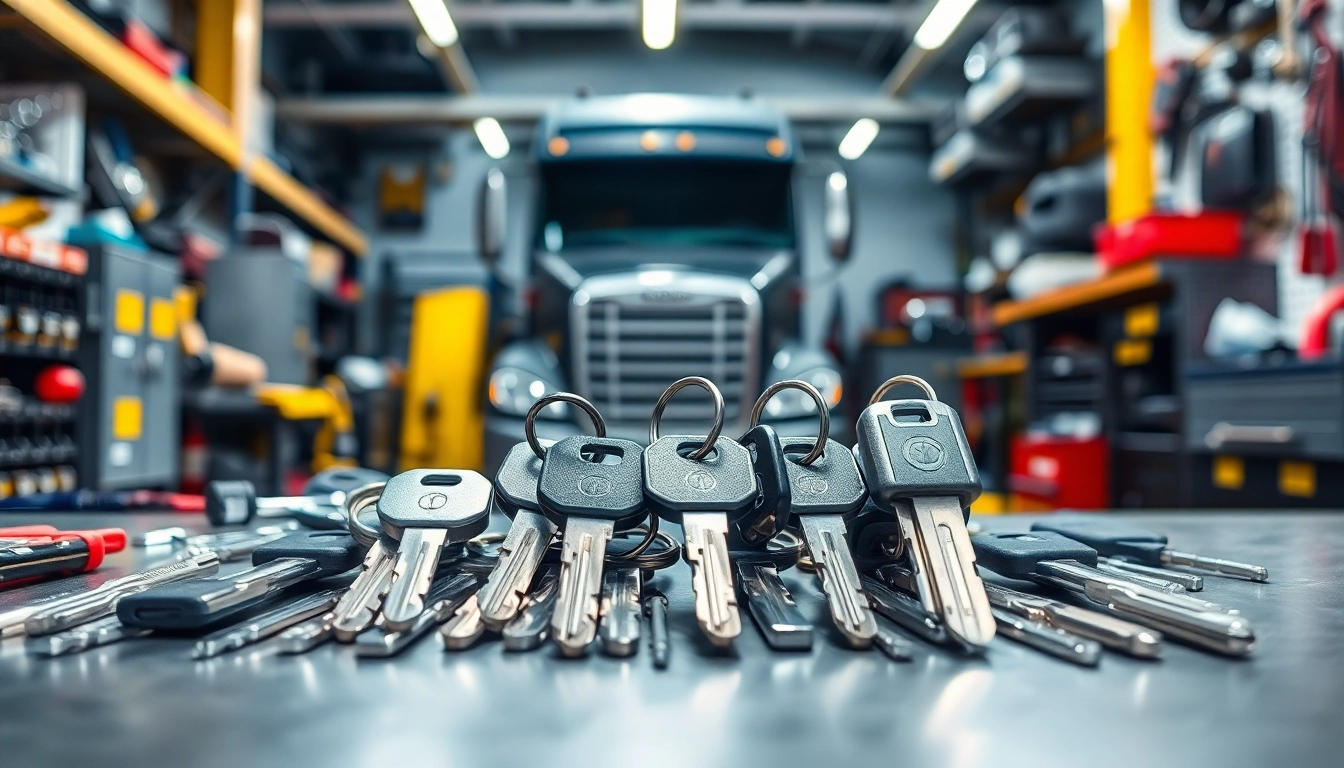Introduction to Truck Keys
When it comes to managing a fleet or simply owning a truck, understanding the different types of keys associated with these vehicles is crucial. Truck Keys play an essential role in operating the vehicle effectively and securely. This comprehensive guide will serve as your go-to resource for everything related to truck keys, including their types, common issues, replacement options, and best practices for security and maintenance.
What Are Truck Keys?
Truck keys are specialized keys designed to operate larger vehicles, which can range from light-duty pickup trucks to heavy-duty commercial trucks. Unlike standard car keys, truck keys can include advanced technologies such as transponder chips, key fobs, and keyless entry systems. This technology not only assists in starting the vehicle but also acts as a barrier against theft.
Types of Truck Keys Available
Understanding the various types of truck keys is invaluable for effective vehicle management:
- Standard Mechanical Keys: These are traditional keys cut to a specific pattern unique to the truck model. They offer basic access to the vehicle and are often used in older trucks.
- Transponder Keys: These keys contain a microchip programmed to the vehicle’s ignition system. They provide enhanced security by preventing unauthorized starting of the engine.
- Key Fobs: These remote devices enable keyless entry and often include functions such as door locking, alarm activation, and engine start.
- Smart Keys: Found in newer truck models, smart keys allow for proximity access, meaning you can unlock and start the truck without physically inserting the key.
The Importance of Having Spare Truck Keys
Having spare truck keys is not merely a convenience; it’s a necessity. Losing the sole key can lead to significant disruptions in operations, especially for businesses relying on trucks for logistics and transportation. Spare keys allow for continuous operation, reduce downtime, and mitigate potential emergency situations. Furthermore, they are invaluable for fleet managers who need to ensure seamless access to vehicles for drivers during their shifts.
Common Issues with Truck Keys
Why Truck Keys Can Become Damaged
Truck keys can suffer damage for several reasons:
- Wear and Tear: Frequent use can lead to physical wear, especially in mechanical keys where the grooves and cuts may become less effective over time.
- Environmental Factors: Exposure to moisture, extreme temperatures, and dirt can compromise the integrity of both mechanical and electronic components within truck keys.
- Improper Handling: Dropping keys frequently or using them for unintended purposes can lead to damage, especially for key fobs that are more delicate than their mechanical counterparts.
Symptoms of a Faulty Truck Key
Recognizing the symptoms of a faulty truck key can save you from greater issues:
- Difficulty Turning the Ignition: If the key struggles to turn, it may indicate wear or damage.
- Intermittent Functionality: For electronic keys or fobs, if they work inconsistently, it could be a sign of a low battery or internal damage.
- Security Errors: For transponder keys, if the engine does not start and the light on the ignition blinks, it could indicate a malfunction in the key’s programming.
How Weather Affects Truck Keys
Weather conditions play a significant role in the longevity and effectiveness of truck keys:
- Humidity and Rain: Moisture can lead to rust and corrosion; this is particularly detrimental to the internal electronic components of key fobs.
- Extreme Cold: Low temperatures can impact the battery life of key fobs and make them less responsive.
- Heat Exposure: Similarly, excessive heat can damage the plastic casing of keys and cause malfunctioning components.
Replacement Options for Truck Keys
DIY Methods for Replacing Truck Keys
While some truck key replacements can be done through DIY methods, it primarily depends on the key type:
- Mechanical Keys: Replacing these is straightforward; you can visit a locksmith or an automotive shop to get a new key cut based on the original pattern.
- Transponder and Smart Keys: These may require specialized equipment to program the new key, thus making DIY options less feasible.
- Replacing Batteries in Key Fobs: This is a simple DIY task. Open the fob, replace the old battery with a new one of the same type, and reassemble the fob.
When to Seek Professional Help for Truck Keys
While DIY solutions can be effective, some situations require professional intervention:
- Lost Keys: If all keys are misplaced, it’s best to consult a professional who can provide replacement or reprogramming services.
- Damaged Keys: If your key displays signs of significant wear or malfunction, professional replacement is recommended to avoid issues while driving.
- Advanced Technologies: For transponder and smart keys, consulting a professional ensures proper programming and compatibility with your truck.
Costs Involved in Truck Key Replacement
The costs of replacing truck keys can vary significantly based on type and technology:
- Standard Mechanical Keys: Typically range from $2 to $10, depending on the locksmith or key cutting service.
- Transponder Keys: These can range from $50 to $150, as they require programming.
- Key Fobs: Expect prices between $70 to $200, which often includes additional programming costs.
- Smart Keys: These are the most expensive, with costs often exceeding $200 due to their advanced technology.
Secure Your Truck: Best Practices
Keeping Your Truck Keys Safe
Preventing loss or theft of truck keys should be a priority. Consider implementing these best practices:
- Use Key Holders: Designate a specific place in the vehicle for keys; this could be a key hook or a storage compartment.
- Limit Key Access: Ensure that only trusted individuals have access to the truck keys, minimizing the risk of loss.
- Invest in Key Tracking Devices: Utilize small tracking devices that can attach to keychains, allowing you to locate them quickly if misplaced.
Using Key Tracking Tech for Truck Keys
Modern technology offers several useful tools to keep track of your truck keys:
- Bluetooth Trackers: These devices can connect to your smartphone, alerting you if you’re leaving without your keys.
- Key Locators: Some systems provide visual cues and sounds to help you find lost keys within a certain range.
- Smart Home Integrations: If you have a home automation system, integrate your key trackers to monitor key status remotely.
Tips for Maintaining Your Truck Keys
Regular maintenance of truck keys can prolong their life:
- Regular Inspection: Periodically check keys for signs of wear or damage.
- Clean Your Keys: Use a soft cloth to wipe them clean of dirt and moisture to ensure their functionality.
- Handle with Care: Always handle your keys with care and avoid using them for purposes other than operating the truck.
Conclusion and Final Thoughts on Truck Keys
Summarizing the Importance of Truck Keys
Truck keys are not just a means to operate your vehicle; they encapsulate safety and security. Understanding their importance can significantly impact both personal use and fleet management.
Future Trends in Truck Key Technology
The future of truck keys looks to be increasingly digital, with trends moving toward smarter keys incorporating biometric access and more advanced encryption. Furthermore, mobile applications may enable owners to control access to their trucks via smartphones, enhancing convenience and security.
Encouraging Action: Ensure You Have Backup Truck Keys
Lastly, consider the practical steps outlined in this guide to ensure that you are always equipped with a backup for your truck keys. Having spares can save you from unplanned expenses and operational disruptions.



